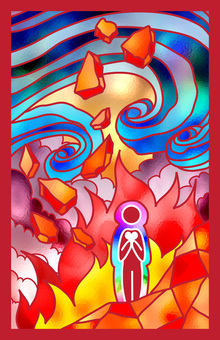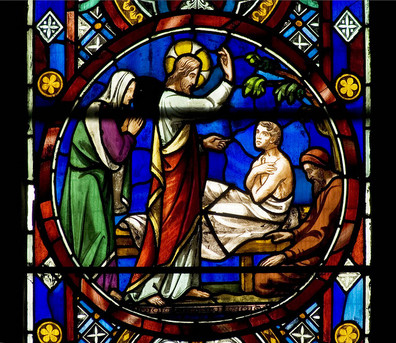
The texts are poignant and heart-wrenching.
“Please come get us now. Please-they shooting”-- from Akyra Murray, 18, the youngest victim.
“I’m going to die. Mommy I love you”-- from Eddie Justice, 30, who texted his mother frequently in the final moments of his life, trapped in the bathroom of the Pulse nightclub.
“I’m dying. Call mami”-- texted by Jeff Rodriguez, 37, to his brother, who thought he was joking. Jeff was one of the lucky ones who survived -- out of the 49 people dead and 53 wounded at the Pulse Nightclub in Orlando, Florida, last Sunday morning.
Not many of us live in the kind of fear known in the LGBTQ community, or by victims of domestic violence or other forms of violence. Most of us can relate to some degree of the fear of the Gerasenes community of our gospel reading, where a demon-possessed man terrorized the town. We have seen or heard stories of criminally insane people harming individuals on the streets or subways of New York – and chalk it up to life in the Big City.
So perhaps then we can imagine the fear of Elijah the prophet who receives word from Queen Jezebel that she plans to murder him – In return for Elijah’s role in the murder of the prophets of Baal and Asherah, the gods she worshipped. And this was in retaliation for the Jezebel’s murder of the prophets of Yahweh, except for a 100 that the prophet Obadiah hid in a cave. And thus the cycle of violence and conflict continues.
This mighty warrior prophet, who predicted drought, brought a widow’s young boy back to life, who faced down King Ahab and emerged triumphant in a and slaughters Queen Jezebel’s prophets, on Mount Carmel now has the wrath of Queen Jezebel on his head. Suddenly his courage leaves him and he flees.
Afraid, he runs away from the kingdom of Israel to Judah, out of Queen Jezebel’s jurisdiction. He goes into the wilderness and asks God that he might die, take my life, he says, I am no better than my ancestors. Ancestors he knows who repeatedly failed to keep the law and who gave into the pressures of the cultures around them. Yet Elijah has not done this. If anything, he has proven himself to be a zealot for Yahweh. Yet Elijah’s fear twists his thinking and clouds his mind.
Elijah continues to travel another 40 days until he reaches the great Mt. Horeb, in the Sinai Peninsula, where God appeared to Moses and the Law was given. In his despair, Elijah hopes to find inspiration back at the source, to the beginning of where the people of Israel received their covenant. There on Mt. Horeb, where Moses once stood and started a new life and forged a new identity, Elijah seeks the same. Yet Elijah hides in a cave, much like Obadiah has hidden the remnant of the prophets of Yahweh in caves.
After a night the Lord comes. Twice in this passage God asks Elijah, “What are you doing here, Elijah?” Elijah doesn’t talk about his fear. That he killed hundreds of Queen Jezebel’s prophets. However he talks about his zeal, and that his fellow-Israelites have forsaken the ways of the covenant, have followed a different path and that he alone is left of them all. He’s leaves out the detail that there are 100 prophets plus Obadiah as well. Elijah really isn’t alone. But he is isolated and vulnerable.
God asks, “What are you doing here, Elijah?” To which Elijah offers the same answer. In his fear, the experience of God or the questions of God have not made an impact. Yet God states that he will use Elijah and sends him on to do difficult tasks. Hard work. Yet God has confidence in Elijah to see things through, despite the crisis of faith he faces.
Many of us are like Elijah. We try to stand up for what is right. To live according to the covenant we have in our hearts with God. We may even have the courage to confront evil when we see it and take a stand. It is hard to do this day in and day out and it takes a toll. We feel the outrage that the massacre that happened at Pulse last Sunday, but we live instead a very disturbing system that permitted this carnage to happen. Every day, on average 36 people are murdered by guns. 297 on average are shot.
Who -- like Akyra, Eddie, Jeff or Elijah, would not get tired of it all? Who would not be tempted to flee to safety – flee as far as you can go? Who would not be afraid with threats from someone capable of carrying them out hanging over your head? Who would not get overwhelmed like Elijah?
Even if we must flee, yet the Scriptures say God will met on the journey and sustain us. If we must find a cave to hide ourselves, God will meet us there. God asks us: What are you doing here? Why are we here?
Even the best of them, Elijah, got scared. Even he fled. Even Elijah needed reassurance of why he was here. God answered Elijah by sending him to his next task. More work was still to be done. Elijah was still needed.
We all need to escape to Mt. Horeb every now and then. We need a cave to retreat to when the world can get to be too much. That doesn’t mean that God is finished with us yet, just because we feel finished. There, in that safe space, God asks, “What are you doing?” And perhaps we ask ourselves: What are we fleeing? Are we abandoning the cause? Are we changing our lives? Are we helping others? Are we just resting? Are we afraid?
God wants us to know ourselves and what we are created for and called to do. For we all have a role in spreading the good news of Jesus Christ. We each have a part to play in promoting the justice and peace of the kingdom. What are we doing? God wants to know, because it is hard work, and it is hard to keep up the stamina if we forget what we are doing here. Like Jesus, we bring sanity and safety to those around us, like Elijah we bring our zeal for God’s covenant.
What are we here for? Because we have a place and a purpose in God’s kingdom. We are called out of the cave and off the mountain because our contribution matters. Our voice is needed, our actions count. No one said that this journey would be easy. Make it we must, for there is a ways to go.
Let us be reminded, what are we here for?
For Akyra.
For Eddie.
For Jeff and all rest who died or were injured that fatal night.
For the 16 and 18 year old teens shot dead in Orlando on Friday.
For Regina Jeffries, a 16 year old Oakland CA. teenager shot to death at a vigil for Orlando.
For Christiana Grimmie, of the TV Show the Voice, also shot to death in Orlando while signing autographs.
For the Charleston 9, the saints of Mother Emmanuel, who were shot and killed just over a year ago at a bible study.
For all those who need our help to hear the good news of Jesus Christ and to stop the madness, and In God’s name -- to stop the madness.
That’s what we’re here for.
https://www.washingtonpost.com/lifestyle/style/for-the-lgbt-community-orlando-shootings-reinforce-the-fear-that-nowhere-is-safe/2016/06/12/9dcd6f68-30d6-11e6-8ff7-7b6c1998b7a0_story.html


 RSS Feed
RSS Feed